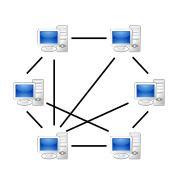Bitcoin's whitepaper says that "A purely peer-to-peer version of electronic cash would allow online payments to be sent directly from one party to another without going through a financial institution". That is, without a trusted third party. But in Bitcoin, instead of the third party being financial institution, it is miners who are in between. So, how bitcoin is peer to peer? And isn't the traditional method of payment, including PayPal etc., peer to peer?
-
1) PayPal is not peer to peer. You send money to the bank account of PayPal or they take it from you bank account. But if you send the money to someone, it's still on the back account of paypal until someton takes it. Paypal is a financial instituation that can decline payments (they did do that in the past). 2) Miners don't check the receiver and sender of a transaction. All, they do is putting valid transactions into a block.– hardforkCommented Jan 9, 2018 at 12:05
-
Right. But for the end user, he just scans the paypal's code of the receiver and payment is done. Sender to receiver. So isn't this peer to peer?– user5155835Commented Jan 9, 2018 at 12:10
2 Answers
miners who are in between
No, miners aren't in between. Miners around of block-chain, they are builders of the chain. *
* As Pieter Wuille says in the comment, anyone can be a miner, but in nowadays that's too hard to be a miner without special hardware.
And isn't the traditional method of payment, including PayPal etc., peer to peer?
No, that's also false, peer-to-peer doesnt have a centralized management.
Here is peer to peer (computer to computer for e.g.).
And here is centralized service like PayPal or whatever:
The PayPal has centralized management.
But for the end user, he just scans the paypal's code of the receiver and payment is done. Sender to receiver. So isn't this peer to peer?
You're simplifying things too much. For example the telephone call, you just speaks with a friend of yours directly, looks like peer-to-peer(friend-to-friend), but under the hood the phone provider in between you and your friend.
-
Thank you. What do you mean by Miners around of block-chain? Commented Jan 9, 2018 at 12:35
-
@user5155835 that's my vision where is miners actually are, nearby of blockchain, not in between you and blockchian neither top or bottom, they're around. Commented Jan 9, 2018 at 12:40
-
They are the once who validate and add transactions to blockchain. A user cannot directly put his transaction into the blockchain. User has to go through the miners. Right? Commented Jan 9, 2018 at 12:41
-
1Transactions flow peer to peer through the network without miners. All nodes also validate transactions. Miners take all these (peer to peer) transactions and put them in blocks to "set the transaction in stone" and add some additional validation on top (these bitcoins are not spend twice, eg. a double spend).– askmikeCommented Jan 9, 2018 at 12:45
-
1The point is that anyone can choose to become a miner. Commented Jan 9, 2018 at 15:12
Bitcoin system is an overlay network(there need not be a physical direct connection among nodes, but at the application level it appears to be connected in a peer-to-peer fashion) among nodes participating in it.
In a centralized system, a central authority for e.g bank, government manages(in PayPal, the managers) all the transactions, balances that are with or related to a user. But in bitcoin ideally, every node keeps a record of account information corresponding to each user with itself (in the form of blockchain) and update it time to time. Practically due to resource constraints only fully validating nodes keeps a track of entire blockchain.
The role of a miner in bitcoin is purely to accumulate the transactions at a single place and add it to the blockchain. To avoid centralization by a single miner this task is randomized so that every node gets a chance to add to the blockchain depending upon the computation power spent by the nodes.


